Rabbi Yaakov Kamenetsky
If you've read the book (below) you surely know what a great man he was. (Its worth reading!)
Paysach Freedman
Jerusalem
Information and pictures I (Eilat) collected about Rabbi Yaakov Kamenetsky and some of his family members from the Internet;
http://chareidi.shemayisrael.com/archives5761/vayakhel/features2.htm
IN-DEPTH FEATURES
Reb Yaakov Kamenetsky
In honor of his yahrtzeit, 29 Adar
by D. Rachelson
In Koloshova, the family of R' Binyomin Kamenetsky was not particularly distinguished. A Torah-observant home where the father worked and earned a respectable livelihood, things would have remained just the same had Heaven not ordained otherwise. In an interesting twist of fate, the father of Reb Binyomin, a timber-dealer and owner of a large flour mill, lost all his business in one night due to the decree of the Russian Tzar.Thus, after the birth of their son Yaakov on 21 Adar, Reb Binyomin moved to a tiny hamlet by the name of Dolhinov. Reb Yaakov later pointed out that had it not been for this move, he would probably have grown up an ordinary businessman and would never have absorbed the unquenchable love of Torah that was prevalent in this small village.His father would take him on Friday night at two in the morning to the beis medrash where the place hummed with learning as though it was midday. The hall was full of people studying Torah, each one according to his level: one learned a shiur on Alshich, another on gemora, and yet another a shiur iyun.In the cheder of this village the hours were long, so long that Reb Yaakov's mother would pack together with his lunch an oil lamp to be used when darkness fell and the boys continued learning.At the age of eleven, he left home to learn in the yeshiva of Minsk. After he passed the entry exam of the rosh yeshiva, HaRav Shlomo Glovenchitz, the latter still doubted whether he should accept him, due to his youth. "You are not even bar mitzvah yet."With childish innocence, the young Yaakov replied, "Well, I came here to learn, not to be the tenth man of a minyan."After a time, the Kamenetsky household moved to Minsk where they hosted the friends of Reb Yaakov, amongst others the future Rav Grozovsky, zt"l, and the young Aaron Kotler, zt"l.Shortly after Pesach in 5665 (1905), Reb Yaakov and Reb Aaron traveled to Slobodke to learn under the supervision of the Alter of Slobodke zt"l. Reb Yaakov also learned in the Yeshivos of Slutzk, Krinik and Moltsh.During World War I he took refuge in Lomza in the yeshiva of Reb Yechiel Michel Gordon zt"l. On 22 Sivan, 5679 (1919), he married the Rebbetzin Ita Ettel, daughter of the Mashgiach Reb Ber Hirsch Heller, zt"l, known in Slobodke as "Der Yunger Mashgiach."From 5681 to 5686, he learned in a kollel in Slobodke that was known for its distinguished members and subsequently he took on the Rabbinate in various places.On 11th Av 5697 (1937) he left for America. His plan was to collect money for the Slobodke Kollel and to cover the debts he incurred from his years as rov in Zitivian, but in fact his future lay in being the "manhig hador" and Hashgocho forced him to stay in America, where he was appointed rov in Toronto. In 5705 (1945), he accepted the request of Reb Shraga Feivel Mendelovitz, zt"l, that he take up the position of rosh yeshiva in Mesivta Torah Vodaas. From this standpoint he disseminated Torah for the rest of his life, standing as a sentry on duty for the Torah's ideals.Reb Yaakov merited to live a long life, his mind lucid and clear till the very end. His chidushim were printed in his seforim Emes LeYaakov, on Torah and on Shas.On 29th Adar 5746 (1986), his pure soul left this world. As he requested, he was buried in Brooklyn, since he pointed out that most of his family live in America and would not always be able to travel to his kever in Eretz Yisroel. From this, his last request we learn yet another chapter of his feelings for others.****************************The words of Chazal in Pirkei Ovos "Ohev es habrios umekarvon laTorah" were the guides and practice of Reb Yaakov throughout his life. Not differentiating between young and old, elderly and even little children, or those who didn't live according to the Torah way of life, Reb Yaakov loved them all."Loving your fellow Jew is a mitzvah in the Torah, and in addition it's a segulah that if the love is given according to the Torah it will bring its recipients closer to Torah and to Hashem." So said Reb Yaakov and so did he.Reb Yaakov was once in the waiting room of a doctor's surgery. Waiting together with him was a young Jewish boy from a totally nonobservant home. Reb Yaakov took a ball and began playing with the child. The talmid accompanying Reb Yaakov was astonished, and pointed out to Reb Yaakov his wonder at the Rov's behavior. "This child will think that a religious rabbi sits and plays ball instead of learning -- or at least he should talk to the boy, convince him to become a baal teshuvah."Reb Yaakov explained, "I saw that with this boy, it is impossible to talk about Yiddishkeit or mitzvos. He comes from a family so far removed from anything Jewish. I just wanted that his picture of a frum Jew should remain one of a pleasant person, so I played ball with him. Who knows, perhaps this impression will one day have an effect on him and he will come closer to Torah and mitzvos.""Once, after my regular study session in my father's home," recounted his son Reb Avrohom, "my father told me that a man and his daughter would soon be coming and requested that I remain in the room when he received the guests. Naturally, I fulfilled his request, but I was quite surprised, for usually when people came to my father I would leave the room and allow them to discuss matters in privacy. When the two of them entered, Reb Yaakov chatted with them, enquiring as to their welfare, occupation, where the father works, which school the daughter goes to, what she learns and more general questions. During the conversation, my father patted me affectionately on the shoulder, and introduced me. `This is my little baby Avrohom,' and continued the conversation. A few minutes later the visit was over and the two of them left the house."Reb Avrohom continued his story, "I was incredulous, wondering what this was all about. I was at the time nearing the end of my 40s and never had I heard my father referring to me as `my little baby.' My father turned to me and explained, `Listen, my son, to what took place here. This father and his daughter, who is the youngest of the family, had a wonderful relationship. He brought her up and educated her in the Torah way, and she accepted and absorbed everything he taught. All was fine, until one day, the father introduced her to a friend of his, saying, `And this is my little baby.' Feeling humiliated by the expression, the daughter was deeply hurt and refused to talk to her father. The latter was broken, since he had not meant to degrade her and his expression was just one of affection for his youngest daughter. She, however, would not be reconciled, and slowly began to cut off all contact with her father.'"Near despair, the father turned to Reb Yaakov knowing that he was the one to turn to. Indeed, Reb Yaakov felt the father's pain, fearing that the girl may perhaps even rebel against her father and her Torah upbringing, chas vesholom, and advised him to bring his daughter to his house on Wednesday. `For that is when I have a shiur with my youngest son, Avrohom. Tell your daughter you have an appointment with me and, if she likes, she may join you.' The daughter was delighted at the privilege of being allowed to go to Reb Yaakov and she arrived together with her father. Some time later, the father contacted Reb Yaakov, thanking him profusely for his wise help and told him that as they left the Rabbi's house, the girl turned to her father. `I see Daddy, that even Reb Yaakov called his son his baby even in front of strangers although he is already a grandfather. Apparently, it's an expression of love of a father to his child,' she enthused. Peace had returned to the household of the man."Engraved on the heart of all his young students are the words spoken by Reb Yaakov at the end of the summer holidays. During the long vacation, Reb Yaakov would travel to Camp Ohr Shraga and learn with the young bochurim as chavrusos. During these sessions of learning in partnership he would not allow any disturbance although his "chavrusoh" was many years younger, so that the young boy would not be hurt.When the summer days were over, Reb Yaakov would turn to his "chavrusos" and say, "Yom Kippur is soon upon us and it's time to make a reckoning. When two people learn together it is very possible that one can unintentionally not treat the other with due respect. I therefore beg your mechiloh in case I slighted you at all in any way."One of his talmidim retells that he was present when Reb Yaakov was writing a letter in the name of the gedolim of America to Reb Yechezkel Abramsky concerning the problem of autopsies. For five long minutes, Reb Yaakov sat, pondering how to acknowledge Reb Yechezkel's Rebbetzin in the letter, who had been the widow of R' Yechiel Michel Gordon, since this was not a private letter, but represented many gedolim and roshei yeshivos. After considerable thought he was pleased to find the right phrase "and we send our brochoh to all who are present in the shadow of Rabbeinu and his Torah," implying the talmidim as well as the Rebbetzin.Reb Yaakov was relieved by this flash of inspiration as he turned to his talmid, "when the letter arrives, R' Yechezkel will probably call his Rebbetzin and show her that she is still remembered in America, thus we will have the mitzvoh of gladdening the heart of an almonoh."
March 21, 2001
Rabbi Nathan Kamenetsky is a son and a son-in-law, respectively, of the late Torah sages Jacob Kamenecki of Mesivta Torah Vodaath, and David Lifshitz of RIETS. He lives in Jerusalem since 1968, and is the author of the much-talked-about book about historical yeshiva figures, "Making of a Godol."a study of episodes in the lives of great Torah personalities
Rabbi Nathan Kamenetsky, educated in yeshivas and subsequently a teacher in them, describes himself as an "autodidact in secular knowledge." The focus of his research is the life of his father, Rabbi Yakov Kamenetsky, who attended the famed yeshiva in Slobodka — a suburb of Kovno, Lithuania — during its glory years during the first quarter of the 20th century. Following World War II, he served as Talmud professor and dean at the Torah Vodaath Rabbinical Seminary in New York City, until his retirement in 1968. He died in 1986 at the age of 95. The elder Kamenetsky was a member of the Moetzes Gedolei HaTorah (Council of Torah Sages) of Agudath Israel
, and hence the book's title signifies "the making of a sage."In this first of what is intended to be many volumes, the author uses the biography of his father through the spring of 1908, when Yakov Kamenetsky returned home from Slobodka for Passover
vacation, as what he calls "a platform" to present a dazzling panorama of the "yeshiva world" from its origins in early 19th-century Volozhin. It is based on an impressive array of written sources emanating both from the yeshiva world and from academia, old newspapers and magazines, his father's taped reminiscences, and an astounding 357 interviews (the interviewees are listed in the bibliography)......
The book should destroy, once and for all, any lingering idyllic notion that pre-war Eastern European Jewry lived a religiously untroubled existence. Already at the turn of the 20th century the world of Jewish tradition was dissolving, as many Jews jettisoned ritual observances. We learn that Yakov Kamenetsky and a number of his fellow students at the yeshiva were the sole members of their families to retain Orthodox ties, and that even children of the most pious and learned among the rabbinical elite — the author names several of them — left the fold. The proximate cause of these defections was the reading of secular books, a pastime frowned upon by Orthodox tradition. Such reading was widespread even among those young yeshiva boys who, in the end, stayed Orthodox and became leading rabbis. Yakov Kamenetsky himself, for example, achieved the equivalent of a high-school diploma through private tutoring, and his classmate, the future charismatic leader of American Orthodoxy Rabbi Aaron Kotler, loved Russian literature, especially the works of Alexander Pushkin. The exposure
that generation of yeshiva students had to the broader world of ideas helps explain the puzzling fact that those European-educated rabbis who taught in American yeshivas in the three decades after World War II were for the most part more open to secular knowledge (Kotler being the exception) than their American-born counterparts, who tended to justify college attendance only for the purpose of making a living. There is, indeed, a wonderful vignette of Rabbi Kamenetsky, in later years, mentioning "Anna Karenina" to his uncomprehending Torah Vodaath students in New York and expressing shock that they never heard of Leo Tolstoy's masterpiece. The bitter ideological divisions within the late-19th- and early-20th-century Jewish community found expression even within the walls of the yeshivas, institutions that we are accustomed to viewing as havens in the storm. Many of the students were secret or open revolutionaries, dedicated to overthrowing the czarist Russian regime that then ruled Lithuania. They sporadically carried out violent demonstrations against the yeshiva administrations, which they saw as collaborating with the government
The dean of the famous yeshiva in Telz, in fact, closed down his school for two months during 1905 so as to rid himself of such troublemakers and repopulate the yeshiva with more politically reliable young men. The internal conflict that receives the most attention in this book, however, will seem far more esoteric to those unfamiliar with the arcana of Orthodoxy, specifically the great struggle over Musar (ethical teachings). In the mid-19th century, Rabbi Yisrael Salanter, one of the most original thinkers in the history of Lithuanian Jewry, criticized his community for neglecting the serious study of ethical texts. By concentrating on intellectual analysis and punctilious performance of the ritual, Salanter felt, Jews had lost the sense of closeness to God, leaving their young people vulnerable to the pull of secular movements. Salanter advocated studying Jewish ethical literature in an atmosphere of spiritual arousal, so that proper conduct toward one's fellow man might regain what he considered its original importance within Judaism.After Salanter's death in 1883, the question of whether Musar should become part of the yeshiva curriculum led to disputes, with many of the rabbis considering such study bitul Torah, a waste of time that could better be spent studying the Talmud, and warning that too much moral introspection was psychologically unhealthy. The pro- and anti-Musar forces sometimes came to blows, and some yeshivas split into two over the issue. In Slobodka, we learn, there were actually two yeshivas; one, Kneseth Yisrael, where Kamenetsky studied, emphasized Musar, and the other, Kneseth Yitzchak, did not. The book presents a fascinating picture of Rabbi Noson Zvi Finkel, known as the "Alter" (old man), the chief Musar instructor at Kneseth Yisrael. This complex man was, on the surface, a gentle, nurturing father figure who inspired scores of students, but he was at the same time a controlling personality who carefully monitored the personal lives of his charges, even having their mail opened and read if he suspected that they were receiving letters from ideologically suspect correspondents. Author Nathan Kamenetsky's foreword demonstrates that he fully expected charedi criticism of this book. He acknowledges the existence of a school of thought within Orthodox circles that denies the importance of factual history, preferring the production of "stories" of the past that teach edifying religious lessons. He quotes one rabbinic advocate of this approach as saying, "We do not need realism: we need inspiration from our forefathers." But Kamenetsky has gone a different route, following the dictum of another rabbi who said, "You cannot educate through lies." In doing so, Kamenetsky has charted a new and exciting path in Orthodox historiography.Lawrence Grossman is co-editor of the American Jewish
http://www.forward.com/issues/2003/03.03.14/arts1.html
The Life and Times of HaGaon
Rabbi Yaakov Kamenetsky
In his 95 years, the gaon Rabbi Yaakov Kamenetsky combined many lives.
He was a product of Slabodka and one of the closest disciples of its legendary
"Alter," the master molder of great people. He was a confident
and advisor or leaders many years his senior. He was the leader of kehillos
on Europe and America. He was rosh yeshivah of Torah Vodaath. He was the
sage, guide, and counselor of American Torah Jewry for half a century,
the man his peers called "the wise man of the generation." To
every question and problem, he had the uncanny ability to marshal the
entire breadth of his encyclopedic Torah knowledge, an unusually rich
life experience, and a clarity of thought that cut to the heart of the
situation. To revere Reb Yaakov was inevitable; to know him was impossible.
He was accessible to everyone, young and old, on his or her own level,
but there were so many layers to him that as soon as someone thought he
knew him, he discovered a new dimension of greatness. To an astonishing
degree, this book presents a fully rounded portrait of Reb Yaakov. The
author has drawn from hundreds of interviews and thousands of recollections
to fashion a portrait oh his life and personality. The reader feels rooted
to the soil from which Reb Yaakov grew and at home in the many environments
where he flourished. And the reader sees how a man saturated with Torah
knowledge and the accumulated wisdom of its sages can relate that rich
tapestry to both modern people and emerging dilemmas. As one turns the
pages of this magnificent book, one is riveted to it. On the last page
the reader is warmed and elevated but the conviction that "how fortunate
we were to have had him among us, and how doubly fortunate that so much
of him could be compressed between the covers of a book."
by Yonason Rosenblum
…….Rabbi Yaakov Kamenetzky said frequently in the name of Rav
Yisroel Salanter (and this was related to me by two of R. Yaakov's grandchildren,
independently, in private conversations--Rabbi Yitzchak Shurin, and Rabbi
Sholom Kamenetzky): "Not everything that one thinks should be said,
not everything that is said should be said publicly, not everything said
publicly should be written down, and not everything written down should
be published."…..
"...radio personality Dov Shurin (FYI: Dov's grandfather, HoRav Yaakov
Kaminetzky was from Dalhinev / Dolginovo)". http://www.countryyossi.com/dec96/shurin.html
Reb Yaakov
The life and times of HaGaon Rabbi Yaakov Kamenetsky.
By Yonason Rosenblum
List Price: $24.99
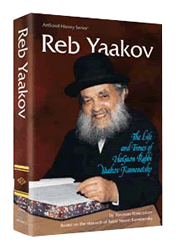
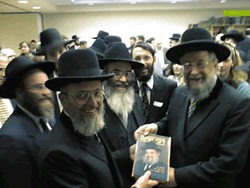
Hagaon Rav Nosson Kamenetsky presenting the Israel's Chief Rabbi Yisrael
Meir Lau shlit"a with the recently published biography of his late
father, Hagaon Rav Yaakov Kamenetsky, zt"l
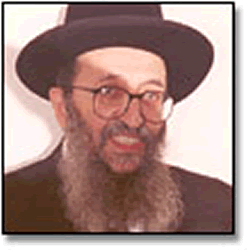
Hagaon Rav Shmuel Kamenetsky, Rosh Yeshiva of the Philadelphia Yeshiva,
HaRav Kamenetsky was accompanied on this visit by his son, HaRav A. Kamenetsky,
a ram in Yeshivas Beis Yisroel
....In his acknowledgments in the book, Reinman thanks Rabbi Sholom Kamenetsky
and his father, Rabbi Shmuel Kamenetsky, who reviewed material in the
book....
"One People, Two Worlds" (Schocken Books, $26) the title of
the current book by a Reform rabbi and an Orthodox rabbi exploring the
issues that divide them, proved to be all too accurate this month when
the Orthodox author, Yosef Reinman — under pressure
from religious leaders in his Charedi community — canceled
a 17-day, 17-city book tour that was to begin Sunday with co-author Ammiel
Hirsch......
http://www.jewishjournal.com/home/preview.php?id=9552
Rabbi Shalom Kamenetsky is a full time Professor of Talmud at the Talmudical
Yeshiva of Philadelphia. He received his Bachelor and Masters of Rabbinic
and Talmudic Studies at the esteemed Beth Medrash Govoha Institute for
Advanced Learning of Lakewood, New Jersey. Rabbi Kamenetsky majored in
Talmudic Jurisprudence. He had considerable exposure in the areas of Religious
Education, Jewish Ethics and Philosophy. He is Lecturer of Talmud at the
OCP of the University of Pennsylvania and accredited Continuing Legal
Education Provider for the Commonwealth of Pennsylvania and the State
of New York. Rabbi Shalom Kamenetsky
Rav Sholom Kamenetsky, Rosh Kollel in
> Philadelphia, son of the Rosh Yeshivah of Yeshiva of Philadelphia
and
> considered the "heir apparent" to become the Rosh Yeshivah,
and of
> course, grandson of Rav Yaakov Kamenetsky (he is also a rebbe of
mine
> and a personal friend). (For those who are interested, Rav Sholom
is
> considered mainstream "Lakewood".) Rav Sholom told me that
it is
> quite clear that the Holocaust was more traumatic. He pointed to
the
> fact that subsequent to the Crusades, Jewish life continued in Europe
> while the Holocaust completely wiped out the Jewish communites of
> Eastern Europe. Rav Sholom also suggested that while it may have
> been appropriate for the gedolim to institute something to
> commemorate the Holocaust, only those great rabbanim (Rav Elchanan
> Wasserman comes to *my* mind) who perished could have been metakein
> an appropriate method of commemoration.
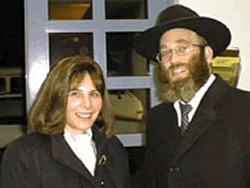
Rav Reuven and Rivka Kamenetsky
Rabbi Yitzchak Shurin
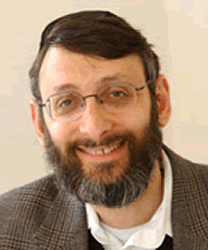
Rabbi Shurin is the Rosh Midrasha of Midreshet Rachel v'Chaya College
of Jewish Studies for Women and a senior faculty member at Yeshivat Darche
Noam/David Shapell College. Rabbi Shurin grew up in New York, and learned
at Yeshivat Rabbeinu Chaim Berlin under Rav Yitzchak Hutner, zt"l.
After receiving an advanced degree in Guidance and Counseling from Nova
University, he moved to Israel in 1977, joining the Kollel and staff of
the original Shapell College. A grandson of Reb Yaakov Kamenetsky, zt"l,
who was one of the spiritual giants of the previous generation, Rabbi
Shurin shares memories of his grandfather, providing his students with
unique insights and an outstanding role model. He recognizes the unfamiliarity
that many have with Torah Judaism and with his sensitivity to their fears
and concerns, he provides them with the connection and bond that many
feel they are lacking.
Rabbi Dovid Kamenetsky
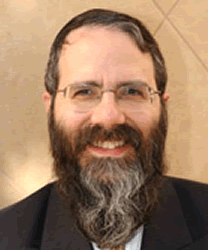
Rabbi Kamenetsky has been with the Yeshivat Darche Noam/ David Shapell
College since 1990. The son of Hagaon Rav Shmuel Kamenetsky, Rosh Yeshiva
of the Philadelphia Yeshiva, Reb Dovid moved to Israel in 1982, where
he learned at the Mir, Brisk, and Mishkan HaTorah. A contributing editor
to the ArtScroll English-language elucidation and commentary on the Talmud,
he currently teaches the mid-level Gemara shiur, emphasizing the necessity
to understand the text clearly. With the same clarity of _expression that
he exhibits in his writing for ArtScroll, he provides his students with
a conceptual understanding of the questions, positions, and arguments
embedded in the text of Gemara
http://www.aishdas.org/avodah/vol03/v03n055.shtml

by Paysach Freedman
Amalek had a vested interest in attacking the Jewish people, whose very
existence proved the existence of God to the world ....
".....Another surprise occurred during my visit to the house of an
ultra-Orthodox rabbi named Paysach Freedman (pictured above). He welcomed
us very warmly into his home. I observed that this great person has the
hope of peace inside his heart. He told us that Judaism has two basic
principles: loving God and loving neighbors. That made me feel happy,
because those are the principles of my religion, Islam. I think that because
there are similarities between the two religions, it will be easier to
achieve peace..."
Mahmoud Al-Ashi (Gaza)
http://www.seedsofpeace.org/site/PageServer?pagename=OB_v8i2campcenter